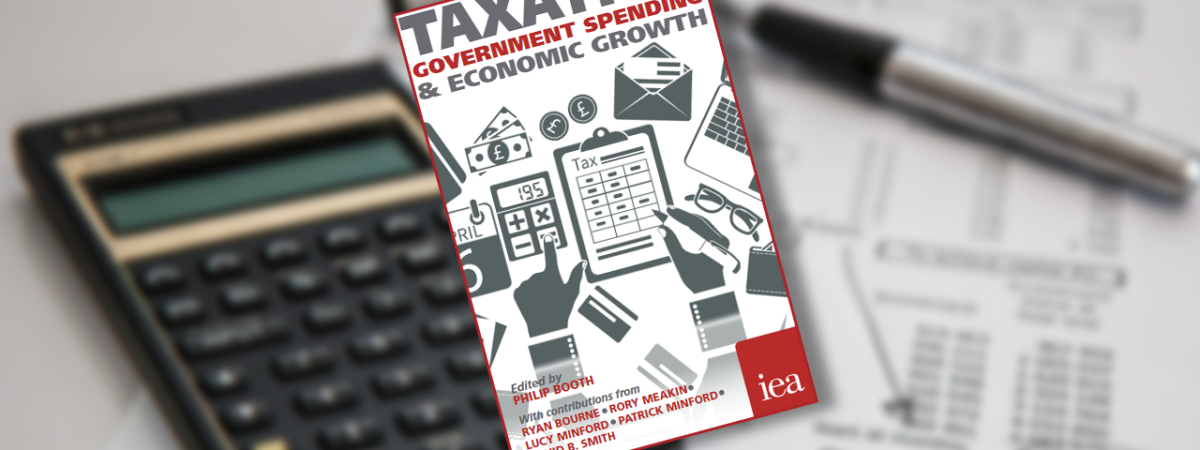Taxation, Government Spending & Economic Growth: In Brief
SUGGESTED


Abolish twenty taxes and go for growth, says IEA

Abolish twenty taxes and go for growth, says IEA
• Taxation and government spending as a proportion of GDP have increased dramatically since World War I. Spending has increased from one-eighth of national income to somewhere between 40 per cent and 45 per cent of GDP today, the actual figure depending on how GDP is measured.
• This is a similar level to the share of government spending in national income in Germany, but considerably higher than in Switzerland, Australia and Ireland, and somewhat higher than the US and New Zealand. Some UK regions have government spending levels between two thirds and three quarters of regional GDP.
• Despite widespread hysteria, there has not been a significant reduction in the level of government spending since 2010. Real spending fell by just 0.5 per cent a year between 2010 and 2015 and is planned to increase through to 2020. Overall, spending as a proportion of national income at factor cost is still planned to be historically high at a level of 41 per cent by 2020.
• The composition of government spending matters for economic growth. Government capital spending can enhance growth, though it should also be judged by its opportunity cost. Government consumption spending tends to harm growth. Badly designed government transfers can undermine growth by worsening incentives. As a proportion of national income, government investment has fallen whilst welfare payments and other government spending have increased since the 1960s.
• Taxation required to finance spending can reduce the size and growth rate of the economy by reducing incentives to save, invest and innovate, or by distorting economic decisions and deterring transactions. Analysis suggests that the growth maximising share of government spending in GDP is between 18.5 per cent and 23.5 per cent of national income at market prices. The welfare maximising share is likely to be somewhat higher than this at between 26.5 per cent and 32.5 per cent. The maximum
sustainable level of government spending is around 37 per cent to 38 per cent of national income. It appears that the UK government is aiming for that level rather than the welfare maximising level.
• A wide body of evidence suggests that high levels of government spending and taxation undermine growth. Growth regression analysis tends to show that a 10 percentage point increase in the burden of each is associated with a 1 percentage point fall in the annual growth rate.
• New modelling, which overcomes some of the problems of the earlier work, finds that a 10 percentage point fall in a combined index of top marginal tax rates and regulation relative to its trend produces a rise in output over about thirty years of 24 per cent. This is equivalent to an increase in the growth rate over the thirty years following the cut of about 0.8 percentage points per annum.
• The design of the tax system to finance government spending affects growth too. Taxes on mobile capital and high marginal rates of tax on income tend to affect growth disproportionately, whereas taxes on land, consumption and so-called ‘externalities’ have less of an impact and may even increase welfare.
• A good tax system should have low negative effects on growth and welfare, low administration and compliance costs, and be nondiscriminatory and transparent.
• The current UK tax system does not live up to these ideals. It is a very badly designed system with high marginal rates, huge complexity, taxes that discourage wealth-creating economic activity and wide-ranging exemptions.
• A better tax system can be created. This would entail abolishing twenty current taxes, including corporation tax, national insurance, capital gains tax, inheritance tax, council tax, and a range of duties. The reformed system would comprise a flat-rate income tax at 15 per cent of income above a personal allowance of £10,000, with distributed corporate profits also taxed at this rate; VAT at 12.5 per cent; a new housing consumption tax at 12.5 per cent; a new location land value tax; and fuel duty at around half the current rate. On a static basis this reform would lead to significant income gains across the income distribution, with particularly significant gains for the poorest.
For the full version of the report, please click here.
The paper featured in The Daily Express, The Daily Mail, The Guardian, City AM and The Mail on Sunday. Following the paper’s release Mark Littlewood wrote for Prospect Magazine, Ryan Bourne wrote for The Telegraph, Philip Booth wrote for City AM and Rory Meakin wrote for Conservative Home.
Fullscreen Mode





